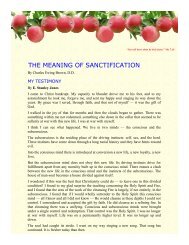W. B. Godbey - Enter His Rest
W. B. Godbey - Enter His Rest
W. B. Godbey - Enter His Rest
Create successful ePaper yourself
Turn your PDF publications into a flip-book with our unique Google optimized e-Paper software.
Dr. Dowie believes that the triune immersion runs back to the beginning. The trouble in that case is the utter<br />
absence of proof. The historians Moshiem, Neander, Wilson and Orchard tell us that immersion was the<br />
primitive mode, (”of course the triune immersion, because the single dip is so recent that we trace it back into<br />
the triune”). The trouble with those authors is the fact that they are all modern men living in the eighteenth and<br />
nineteenth centuries, and they quote no ancient author, consequently they merely take it for granted and say it,<br />
while they do not prove it. This is the way with Dowie. He knows that triune immersion was the baptism<br />
through the long, rolling ages and thinks it runs back to the apostles. In the controversy Dowie has decidedly the<br />
advantage in the way of antiquity, but the trouble is that we cannot trace it beyond the third century, when they<br />
were running into the ages of darkness and superstition.<br />
The oldest historian who has told us anything about this subject is Lactantius of the third century.<br />
He certainly lived near enough to the apostolic age to have a chance to know, as a matter of popular information<br />
transmitted through that short space. The apostle John lived down through about thirty years of the second<br />
century. Therefore we ought to have reliable information as to the apostolic practice from a man living in the<br />
third century. Lactantius wrote in Latin, so we give you his testimony in his own language: “Johanes Baptisres<br />
tinxit, Petrus tinxit, et Christus apostolos misit ut gentes tingerent.” I now translate this into English for your<br />
benefit, “John the Baptist sprinkled, Peter sprinkled, and Christ sent the apostles that they should sprinkle the<br />
nations.” The whole controversy of this out of the Latin into the English hangs on that word “tinxit,” which is<br />
from tingo.<br />
We have the same word Anglicized in our language, in “tinge,” which you see simply results from dropping the<br />
terminal “o,” and adding “e.” You can now take Webster's dictionary and satisfy yourself as to the meaning.<br />
Literally, John the Baptist tinged, Peter tinged, and Christ sent <strong>His</strong> apostles that they should tinge the nations.<br />
I remember that when I was studying Latin in college, I read in Horace about an old Roman who was so rich<br />
and luxuriant that he sprinkled his pavement with the best of wine, in order to laden the air with a delicious<br />
aroma, and this word “tingo” was there used. You know it could not be construed to mean immersion in that<br />
construction.<br />
But after all our researches in history, secular and ecclesiastical, the Bible itself must settle this and all other<br />
questions. The hypothesis assumed by some immersionists that baptizo has no other meaning, is utterly<br />
untenable. Origen, the greatest classical scholar in the Church in the third century, whose father and grandfather<br />
had both preached and suffered martyrdom, uses this word baptizo to describe the water on Elijah's altar on<br />
Mount Carmel, when he refuted the prophets of Baal.<br />
There is no doubt but that immerse was perhaps the most prominent pagan meaning of the word.<br />
But you must remember that when the great universal language, the most learned ever known, the acme of<br />
Grecian learning, was selected by the Holy Ghost to reveal <strong>His</strong> precious truth, many words at once received a<br />
new meaning; e. g.) theos, “god,” in all the writings of the Greek authors, who were an exceedingly religious<br />
people, as Paul well said on the Areopagus, not as the English Version has it, “too superstitious.” Therefore the<br />
word theos was as common in their writing as God is in ours, yet this word never did mean our blessed and true<br />
God, who is the subject of the Bible, of whom they were utterly ignorant, but when they wrote theos they meant<br />
some of their gods, who were really idols. Therefore if we would stick to the pagan meaning of theos, we would<br />
mean Jupiter, Apollo, Mercury, or some other Grecian divinity who was nothing but an idol.<br />
I could give you many similar illustrations, showing you that the words of this great and learned heathen<br />
language, the Greek, received a different meaning, or rather a modified meaning, when they were used to reveal<br />
the precious truths of God. We must let the Bible be its own dictionary. Good Lord, save us from a superficial<br />
adherence to dictionaries! Do you not know that dictionaries are not the original authority of language, but the<br />
classical writings? Luther, Melancthon, Zwingle, and their contemporaries, had no dictionaries. They had not<br />
been made. They were a subsequent work, when noble scholars, by diligent study of the classical writings, saw<br />
the sense in which the different authors, who were the legitimate exponents of languages, used various words. In<br />
this way the Bible dictionaries are made, by a diligent study of the Bible itself, and seeing the signification in<br />
which every word is used by the inspired writers. I have often known preachers to get up and read from some









